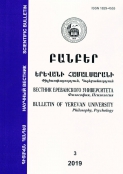DEVOLUTION OF HUMAN CONDUCT: ETHOLOGICAL AND PSYCHOLOGICAL STUDY
DOI:
https://doi.org/10.46991/BYSU:E/2019.10.3.048Keywords:
evolution, conduct devolution, pattern, ritual and symbolic behavior, defense mechanism of regressionAbstract
The article deals with the formation and manifestation of human conduct as a relatively independent devolution phenomenon. It is the first time that we have used the term ‘Devolution’ in Psychology for describing a new phenomenon that we have noticed in human conduct. Not contradicting the theory of evolution, even accepting its methodology, we discuss the changes in human conduct in terms of devolution rather than evolution. Not the escape, but return… In the theory of evolution and ethology, it is hardly spoken about the development of the conduct. Mainly, the conduct is connected with the evolutional level of an animal, but we think that conduct also has the feature of changing independently. Human evolution can be viewed (and should) not only from the perspective of biological models where psychic development occupies a derivative place but also from cognitivebehavioral models, which have relatively independent developments. Very often a contemporary man adjusting to his environment, and gradually he impacts it less and less. We don’t speak here about simple passivity but about the impediment of progress with the degradation of conduct taking place. It is not a commonly known regressive defense mechanism (regressive conduct), but an awakening of a lower level of evolutional conduct. In the first case, the phenomenon is ontogenetical, in the second one-phylogenetic. In the first case, the defensive mechanism is directed towards the adaptation of a person, in the second case, we talk about a return to previous sensations of security and preservation of ancient species. Human psychic evolution hasn’t crossed the point of irreversibility: in some borderline situations, there appear early patterns of conduct with phylogenic and anthropogenic nature, which secure human adaptation in his environment by non-normative forms.
Downloads
Published
Issue
Section
License
Copyright (c) 2019 Bulletin of Yerevan University

This work is licensed under a Creative Commons Attribution-NonCommercial 4.0 International License.

